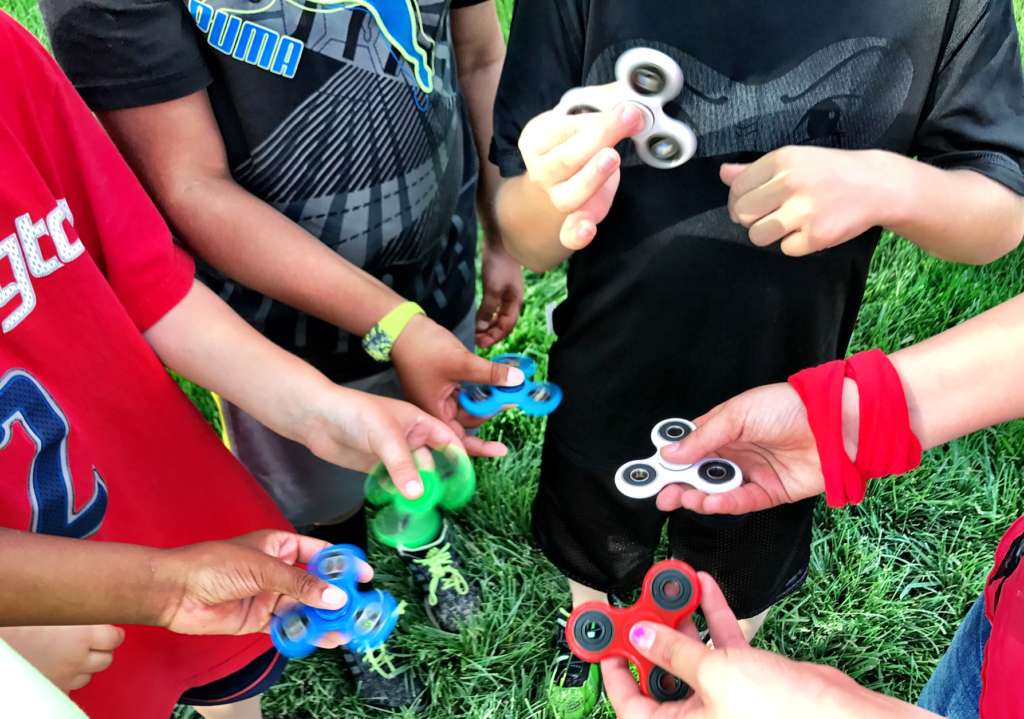WASHINGTON — The current must-have toy craze has something extra to offer besides being colorful, inexpensive, simple to operate, and ubiquitous — it’s supposed to help children focus.
A fidget spinner is a small toy, in the top family, that can be spun between a user’s thumb and middle finger. Ball bearings can keep the toy whirring for several minutes.
In the current demonstration of the current “it’s a thing” status, young people are posting videos of fidget spinner tricks, and sharing hacks to make them spin faster.
Unlike recent toy sensations, including slime, and Hatchimals, and earlier crazes, such as slap bracelets, fidget spinners are being marketed as beneficial to children and adults who need help focusing on tasks.
Most of the 20 pages of fidget spinners for sale on Amazon say they reduce stress. Others even claim to be “perfect for ADD, ADHD, anxiety and autism.”
Some mental health and education experts agree that mindlessly playing with something like a pen or coin while thinking can be soothing and allow a student to concentrate better.

Other teachers aren’t convinced.
“They don’t help in my class. I teach computers so kids need both hands,” said one teacher, who asked not to be identified.
One local middle school teacher says other less-fun items, like stress balls, are better options.
Some teachers are banning fidget spinners, because students are trading them, performing tricks, and distracting other students.
“Fidgets are great tools for kids who need them, as long as there are ground rules set up with the child and educator in advance, and as long as the child can follow the rules,” said Montgomery County, Maryland-based occupational therapist Katherine Ross-Keller.
“One of the rules for using fidgets during instructional time should absolutely be that fidgets are discreet.”
Fairfax County, Virginia-based ADHD coach Crista Hopp agrees.
“When hands or any other body part is moving, an individual is able to focus more on what they need to,” Hopp said.
Ross-Keller believes schools should be more focused on play-based, active learning, and less on seated work.
“I would bet that we would see much less of a need for these focus tools,” she said.
Montgomery County-based occupational therapist Stephen Poss doesn’t believe the fidget spinners have much therapeutic value.
“The spinner toys, in my opinion, and that of teachers I’ve spoken to, are just that — toys,” said Poss, who recommends fidget objects that offer resistance, such as a squeeze ball or balloon filled with flour.
“Fidget objects are meant to be felt, so that visual attention can be focused on the teacher,” said Poss. “Spinner toys are visually distracting, and I think that’s their major drawback.”
In fact, Poss believes when working with children on the autistic spectrum, “spinning objects often lead to ‘visual stimming’ and are more of a hindrance than a help.”
“Stimming,” is a repetitive set of physical motions, often used by children on the autistic spectrum, as a way of calming and stimulating themselves.
On Twitter, some adults hope the toy can help them relax as they deal with life challenges.
@AugensteinWTOP I will have some doctors appointments this week, find out results of my daughters biopsy for Cancer. I’m going to spin away and pray. 🙏
— beantbear (@beantbear) April 23, 2017
@AugensteinWTOP Not a teacher but I’ve always been a fidgeter and found out I had ADHD 2 years ago. I recently bought some fidget spinners & love!
— Judith (@msnewjudi) April 23, 2017
According to Wikipedia, the fidget spinner was patented in 1997, by Catherine A. Hettinger. The patent has expired, resulting in many manufacturers making spinners with different names and shapes.
The recent availability in non-toy-stores like 7-Eleven, are making fidget spinners both more well-known and difficult to find.
Over the weekend, searches for fidget spinners included promises that new shipments were on the way.
An employee at the Five Below discount store, aimed at teens and preteens, said she didn’t recall the last time the “Limit 2 per customer” sign had to be placed on the front counter, where the spinner stash sat.
Parents are feeling the pressure from their children.
@AugensteinWTOP My 7yo told me she has to get one. But I refuse to learn what it actually is. 😀
— David J. Montgomery (@djmont) April 24, 2017
While the spinner fad flourishes, models are being made of plastic, wood, bicycle chains, up to a $199 Titanium spinner. The SpinnerList offers a searchable data base of over 200 models.







